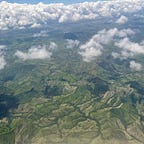Cause & Effect of Agriculture on the Climate
The Effects of Agriculture on Climate Change and Solutions
Agriculture is both an essential part of our daily lives and a significant contributor to climate change and environmental degradation. From the food we eat to the clothes we wear, agriculture touches every aspect of our existence. However, the practices involved in producing and transporting agricultural goods significantly impact the planet. Greenhouse gas emissions, water usage, habitat destruction, soil pollution, and deforestation are some environmental challenges arising from agriculture. In this article, I want to highlight some of the causes and effects of agriculture on the environment and discuss potential solutions to mitigate its negative impacts.
- Pollution: Agriculture is among the leading polluters of water pollution and greenhouse gas emissions (GHG). Pesticides can poison the water, seep into the soil, and pollute the surrounding habitat. According to World Wild Life, “Many pesticides are suspected of disrupting the hormonal systems of people and wildlife. Fertilizer run-off impacts waterways and coral reefs”. Animal agriculture has enormous effects on GHG emissions. The combined emissions from all aspects of animal agriculture would account for 18% of all global emissions, excluding the emissions from transportation. Furthermore, a new study found that stopping meat production and consumption could stabilize CO2 emissions for 30 years.
- Deforestation: We are removing forest land for farms and agriculture. Greenpeace says, “Some 80% of global deforestation is a result of agricultural production, which is also the leading cause of habitat destruction. Animal agriculture — livestock and animal feed is a significant driver of deforestation,”. The increase in demand for meat and crops is causing an increase in deforestation. Deforestation can affect the surrounding habitat and offset the ecosystem. NASA illustrates, “In 2020, for instance, Earth lost about 4.2 million hectares (16,000 square miles) of humid tropical primary forest — an area about the size of the Netherlands. Nearly half of that, their analysis shows, was due to food production, and half of that was due to commodity crops. In recent years, commodity crop production has pushed rates of forest loss to record levels”. Agriculture is soon going to destabilize ecosystems through deforestation.
- Water: Water is a necessity when caring for crops and nurturing animals. Since we are inefficiently using water to help facilitate agriculture, the agriculture and farming sector consumes “about 69 percent of the planet’s fresh water”, according to the World Wild Life, “Without creative conservation measures in place, agricultural production consumes excessive water and degrades water quality. This adversely impacts freshwater systems throughout the world”. We need to find ways to nurture the crops and animals just the same while efficiently using the water.
Agriculture is a crucial part of our daily lives, but its impact on the environment cannot be ignored. The significant greenhouse gas emissions, water usage, and deforestation caused by farming and animal agriculture can have devastating consequences. However, it’s not all doom and gloom. People are taking notice of the problem and investing in solutions to combat it.
There has recently been a 325 million dollar investment in 71 agriculture projects. All further investment in projects to help find solutions is what we need to hinder the effects on the environment. The investment in projects is said to help “Expand markets for America’s climate-smart commodities, leverage the greenhouse gas benefits of climate-smart commodity production, provide direct, meaningful benefits to production agriculture, including for small and underserved producers across the country,” as described by The Packer. Innovating solutions to our problems is the only way to hinder the climate crisis efficiently.
